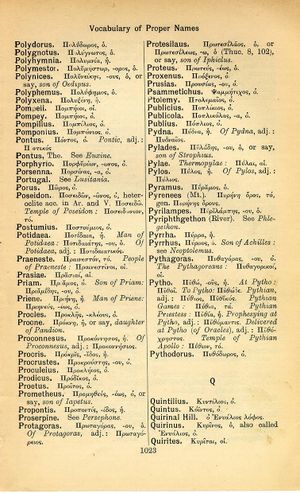Pythagoras
κακοὶ μάρτυρες ἀνθρώποισιν ὀφθαλμοὶ καὶ ὦτα βαρβάρους ψυχὰς ἐχόντων → eyes and ears are poor witnesses for men if their souls do not understand the language (Heraclitus Phil.: Fr. B 107; Testimonia: Fragment 16, line 6)
English > Greek (Woodhouse)
Πυθαγόρας, -ου, ὁ.
The Pythagoreans: Πυθαγορικοί, οἱ.
Latin > English (Lewis & Short)
Pȳthăgŏras: ae, m., = Πυθαγόρας,>
I a celebrated philosopher of Samos, about 550 B.C.; he taught in Lower Italy (Croton and Metapontum), and was the founder of the Pythagorean philosophy, which received its name from him, Cic. Tusc. 1, 10, 20; 1, 16, 38; 4, 1, 2; id. Fin. 5, 2, 4; id. Div. 1, 3, 5; Hor. S. 2, 6, 63; Ov. M. 15, 60; Liv. 1, 18.— The Greek letter γ (called littera Pythagorae), with its two divergent arms, was used by Pythagoras as a symbol of the two diverse paths of life, that of virtue and of vice, Aus. Idyll. 12, 9; cf. Pers. 3, 56; v. also Lact. 6, 3, 6.—Hence,
A Pȳthăgŏrēus or Pȳthăgŏrīus, a, um, adj., = Πυθαγόρειος,> Pythagorean: somnia, Hor. Ep. 2, 1, 52: dogma, Lab. ap. Prisc. p. 679: pavo, into which, according to the Pythagorean doctrine of metempsychosis, the soul of Euphorbus had passed before it reached Pythagoras, Pers. 6, 11: brassica, highly recommended by Pythagoras, Cato, R. R. 157 in lemm. (cf. Plin. 20, 9, 33, § 78): mos, Plin. 35, 12, 46, § 160.—Plur, subst.: Pȳthă-gŏrēi (-ŏrīi), ōrum, m., the followers of the Pythagorean philosophy, the Pythagoreans, Cic. Tusc. 1, 16, 38; id. de Or. 2, 37, 154 al.—
B Pȳthăgŏrĭcus, a, um, adj., = Πυθαγορικός Pythagorean: libri, Liv. 30, 29: philosophia, Plin. 13, 13, 27, § 86 (an interpolated passage, v. Sillig in loc.): prudentia, Val. Max. 4, 7, 1 (but Pythagorii, Cic. Div. 1, 30, 62 B. and K.; cf. Madv. Opusc. Ac. 1, p. 512).
Latin > French (Gaffiot 2016)
Pȳthăgŏrās,¹² æ, m. (Πυθαγόρας), Pythagore [de Samos, célèbre philosophe qui enseigna longtemps à Crotone] : Cic. Tusc. 1, 20 ; Rep. 2, 28 ; littera Pythagoræ la lettre de Pythagore = Υ [représentant les deux routes ouvertes devant un mortel, celle du vice et celle de la vertu] : Aus. Idyll. 12, 9 ; Lact. Inst. 6, 3, 6 ; cf. Pers. 3, 56

